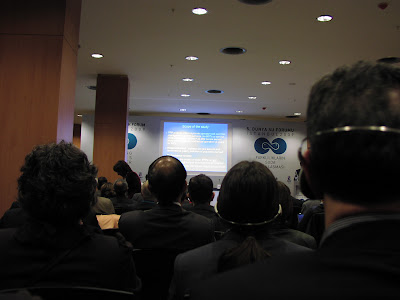
Late in the afternoon, on the first day of the fifth World Water Forum, attention in the main venue, Sülüce, turned to the issue of “Optimizing public and private in public services” - “Towards a vibrant marketplace – Opportunities and trends, experience to date, and policy options for the future”. The session was coordinated by members of the World Water Council (WWC) - a body that promotes private sector involvement in water management.
Philippe Marin, a senior water and sanitation specialist at the World Bank and a member of the Public Private Infrastructure Advisory Facility (PPIAF) (which also promotes private sector involvement) introduced the session, sharing details of the findings of a new World Bank (WB) study reviewing the experiences of Public Private Partnerships (PPPs) in developing countries. Given the high number of well-publicised failures, PPPs are no longer seen by the World Bank as a “magical formula”. But the study looked at whether those failures were actually distracting from the bigger picture... and although the author repeatedly stressed that his goal was not to determine whether the public or private sector was superior, and that the over-arching priority was to “find ways to improve services”, there was more than a suggestion at times that he believed the private sector held the upper hand.
The private sector, for example, was found to have a superior operational efficiency thanks to better bill collection rates, increased productivity (as a result of massive lay-offs) and lower non-revenue water rates (water produced but not sold due to leakage or theft). And he quoted a recent WB study (Gassner et al., 2008) showing that PPPs' impact on tariffs was neutral “when properly compared, i.e. with similar public utilities operating under framework that foster financial sustainability”. That is when compared with public utilities using private sector-inspired pricing methods...
All this led to: “Lesson 1: PPPs are a viable option for water”. As one participant from the floor said, all this gave the impression that the study's objective was not so much about finding the best policy options for water regardless of the private vs. public debate but “finding a way to save the private sector from its failures”.
Paul Reiter from the International Water Association (IWA) started by saying that “PPPs are not the solution” and a “more complex approach is needed”. This, he suggested, could involve “offering new services”, a greater focus on developing countries' private water operators, “alternative procurement models”... but stressing that “you need the private sector for service provision”. This, he suggested, could mean promoting the use of performance indicators and reserving a strong role to local public banks, an approach which echoes the private sector's current strategy of bypassing the public vs. private debate by insisting on narrow financially-driven performance measurement and public risk mitigation for private utility operations.
Other panellists included Jack Moss from Aquafed, the Federation of Private Water Operators, José Frade from the European Investment Bank (who stressed that the debate was going nowhere as long as political conditions for utility operations were not met, and that “PPPs are a disguised failure”) and Bjorn Von Euler from engineering company ITT.
Several participants challenged the panel from the floor, demanding to know why working conditions and poor people's access to water was not included in the operational efficiency definition. “Developing a network without allowing people access it was useless,” one said. Another criticised the “World Bank’s disproportionate focus on market solutions”.
Others highlighted how, despite the allegedly transparent and inclusive process, the WWF remained a corporate-driven, non-democratic process, which the 27 activists arrested during the morning's protest could bitterly testify.
Lance Veotte, from the South African Municipal Workers' Union (SAMWU), wondered after the conference about the coherence of the WWF's discourse: “At The Hague in 2000, it was all about the magical recipe of total private sector involvement, and now they acknowledge that it was wrong; why trust them now? The trust relationship is at stake”.
David Hall, director of Public Services Research Unit (PSIRU), said that “the World Bank and PPIAF are still completely inside the box on what private sector wants.” The result is that “we are confronted with a series of critical comments and questions getting increasingly agitated and aggressive”.

No comments:
Post a Comment